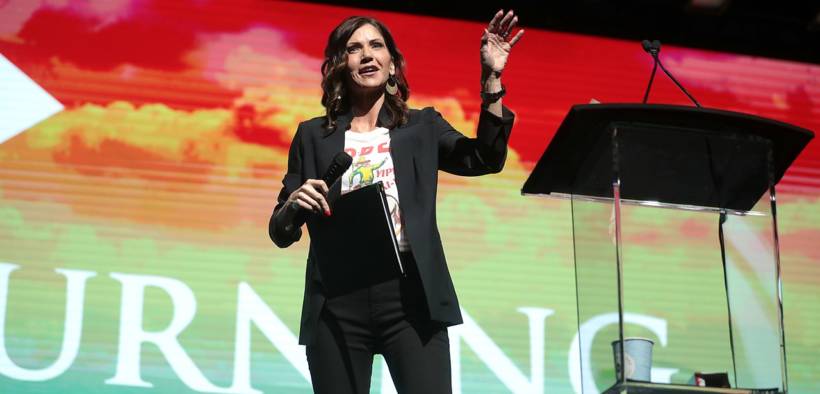South Dakota Governor Offers Compromise on Tribal Coronavirus Checkpoints

“It wasn’t until checkpoints come about, then all of a sudden we’re a focus, a center of attention. You know we’ve been wanting assistance for test kits, we’ve been wanting assistance with (personal protective equipment), we’ve been wanting assistance to get more hospital beds built on our reservations.”
South Dakota Gov. Kristi Noem informed a Sioux tribe that it may have checkpoints, but not on federal and state highways. The governor’s offer on Tuesday was an attempt to end a standoff between two tribes — the Oglala Sioux and Cheyenne River Sioux — and the state. The checkpoints were set up to screen travelers for the COVID-19 virus, a strategy tribal leaders have defended as crucial to protecting their vulnerable communities, CNN reported.
Access Denied
Noem informed the tribes that they can locate the checkpoints on tribal roads or streets belonging to the Bureau of Indian Affairs, including roads that provide access to highways.
“I understand and support your desire to protect your people, and it is within your tribal sovereignty to establish checkpoints on BIA/tribal road,” Noem wrote. “This means anyone turning off a US or state highway for a destination within your reservation could be subject to a tribal checkpoint.”
She also asked for “reasonable accommodations” for emergency and delivery services. In the past, she expressed concerns with tribal checkpoints inhibiting them.
“Deliveries of gas, medical supplies and food are incredibly important to make sure that we have that facilitated through these areas,” Noem said. “Checkpoints have been an issue with allowing those types of services to get through.”
Finally, Some Attention
The tribes defied Noem’s order to remove the checkpoints over the weekend even Noem’s threat to settle the matter in federal court did little to sway the tribes. Cheyenne River Sioux Tribe Chairman Harold Frazier confirmed he received Noem’s letter on Tuesday, but has refrained from issuing an official response yet. Instead, he expressed surprise at the attention the checkpoints have received.
“It wasn’t until checkpoints come about, then all of a sudden we’re a focus, a center of attention,” Frazier said during an interview with South Dakota-based KIPI radio. “You know we’ve been wanting assistance for test kits, we’ve been wanting assistance with (personal protective equipment), we’ve been wanting assistance to get more hospital beds built on our reservations.”
Who Has Sovereignty?
The legality of the checkpoints is open to legal interpretation and both have tried to argue the law is on their side, CNN reported. The governor’s policy director, Maggie Seidel, justified Noem’s order by referring an April 8 memorandum issued by the US Department of Interior’s Bureau of Indian Affairs. The policy gives native groups the authority to temporarily “restrict road use or close” roads they own during “life-threatening situations.”
Under the department’s guidelines, tribes are not required to provide an advance notice to the Secretary of the Interior or landowners who may be affected. However, for roads the tribes do not own, such as state and federal highways, the memorandum specifies that tribes cannot restrict the flow of traffic until they have coordinated with the road owner and agreed on the conditions of the closure.
According to the memorandum, the South Dakotan government believes it has the right to force tribes to remove checkpoints. However, the tribes and some state legislators cited a pair of treaties and an appeals court ruling in their defense. The Fort Laramie Treaties of 1851 and 1868 were signed between tribal nations and the US government. Tribes agreed to allow peaceful passage of traders and the building of roads. In exchange, Washington recognized the tribes’ complete ownership of the land.
In 1990, the 8th Circuit Court of Appeals upheld the treaties and “held that the State of South Dakota has no jurisdiction over the highways running through Indian lands in the state without tribal consent.”
Whereas the April 8 memorandum focuses on ownership of the roads as the deciding factor, precedent set by the court considers the ownership of the land as the deciding factor.
Legislators Side with Tribes
A group of legislators urged Noem to find a solution to the disagreement that would avoid a court battle, NPR reported.
“Your statement that Tribal governments do not possess the ability to establish checkpoints within the boundaries of their homelands is not accurate,” they wrote. “We do not wish to be party of another lawsuit that will ultimately cost the people of South Dakota more money.”
Tribes face a greater threat from COVID-19, Frazier said, because they lack access to medical facilities.
“The nearest health care, critical care is three hours away from where we live,” he said. On the reservation, an eight medical beds comprise the tribe’s medical facility with no intensive care unit in sight.
The tribes are living under lockdown with stay-at-home orders and curfews taken seriously. Traffic throughout the tribal land, unless essential, is prohibited. Conversely, Noem has not issued any such statewide orders, according to an NPR report.
“We both want what is best for South Dakota and all of its residents (both tribal and non-tribal) in this fight against COVID-19,” Noem wrote. “And I believe this is a reasonable pathway forward.”















